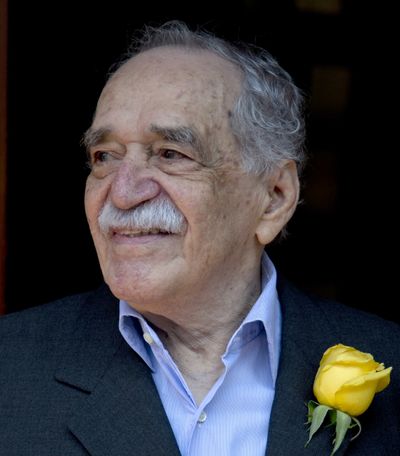Nobel laureate author Garcia Marquez dies

MEXICO CITY – Gabriel Garcia Marquez, the Nobel laureate whose intoxicating novels and short stories exposed millions outside Latin America to its passions, superstition, violence and social inequality, died at home in Mexico City on Thursday. He was 87.
Widely considered the most popular Spanish-language writer since Miguel de Cervantes in the 17th century, the Colombian-born Garcia Marquez achieved literary celebrity that spawned comparisons to Mark Twain and Charles Dickens.
His flamboyant and melancholy fictional works – among them “Chronicle of a Death Foretold,” “Love in the Time of Cholera” and “Autumn of the Patriarch” – outsold everything published in Spanish except the Bible. The epic 1967 novel “One Hundred Years of Solitude” sold more than 50 million copies in more than 25 languages.
His stories made him literature’s best-known practitioner of magical realism, the fictional blending of the everyday with fantastical elements such as a boy born with a pig’s tail and a man trailed by a cloud of yellow butterflies.
The Mexican government said Garcia Marquez died at 2 p.m. A gray hearse escorted by dozens of police officers in patrol cars and on motorcycles left the author’s home about three hours later.
“A thousand years of solitude and sadness because of the death of the greatest Colombian of all time!” Colombian President Juan Manuel Santos said on Twitter. “Solidarity and condolences to his wife and family … Such giants never die.”
The first sentence of “One Hundred Years of Solitude” has become one of the most famous opening lines of all time: “Many years later, as he faced the firing squad, Colonel Aureliano Buendia was to remember that distant afternoon when his father took him to discover ice.”
Biographer Gerald Martin told the Associated Press that the novel was the first in which “Latin Americans recognized themselves, that defined them, celebrated their passion, their intensity, their spirituality and superstition, their grand propensity for failure.”
The Mexican government said it would hold a memorial to Garcia Marquez on Monday in the Art Deco Palace of Fine Arts in the capitol’s historic center.
“It’s a loss for all Spanish-language literature,” said Monica Hernandez, a 28-year-old fan who laid a bouquet of light-pink flowers on the doorstep of Garcia Marquez’s home.
When he accepted the Nobel prize for literature in 1982, Garcia Marquez described Latin America as a “source of insatiable creativity, full of sorrow and beauty, of which this roving and nostalgic Colombian is but one cipher more, singled out by fortune.”
“Poets and beggars, musicians and prophets, warriors and scoundrels, all creatures of that unbridled reality, we have had to ask but little of imagination, for our crucial problem has been a lack of conventional means to render our lives believable,” he added.
Like many Latin American writers, he transcended the world of letters. Widely known as “Gabo,” he became a hero to the left as an early ally of Cuban leader Fidel Castro and a critic of Washington’s violent interventions from Vietnam to Chile.
Garcia Marquez, among writers such as Norman Mailer and Tom Wolfe, was also an early practitioner of literary nonfiction now known as New Journalism. He became an elder statesman of Latin American journalism, with magisterial works of nonfiction that included “Story of A Shipwrecked Sailor,” the tale of a seaman lost on a life raft for 10 days.
Other nonfiction pieces profiled Venezuela’s larger-than-life president, Hugo Chavez, and vividly portrayed how cocaine traffickers led by Pablo Escobar shredded the social and moral fabric of the writer’s native Colombia. In 1994, he founded the Iberoamerican Foundation for New Journalism, which offers training and competitions to raise the standard of narrative and investigative journalism across Latin America.
“The world has lost one of its greatest visionary writers – and one of my favorites from the time I was young,” U.S. President Barack Obama said.
Garcia Marquez was born in Aracataca, a small town near Colombia’s Caribbean coast, on March 6, 1927. He was the eldest of the 11 children of Luisa Santiaga Marquez and Gabriel Elijio Garcia, a telegraphist and a wandering homeopathic pharmacist.
Just after his birth, his parents left him with his maternal grandparents and moved to Barranquilla to open a pharmacy. He spent 10 years with his grandmother and his grandfather, a retired colonel who fought in the devastating 1,000-Day War that hastened Colombia’s loss of the Panamanian isthmus.
“I have often been told by the family that I started recounting things, stories and so on, almost since I was born – ever since I could speak,” Garcia Marquez once told an interviewer.